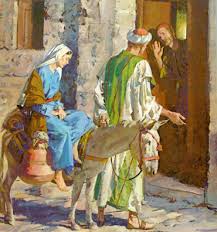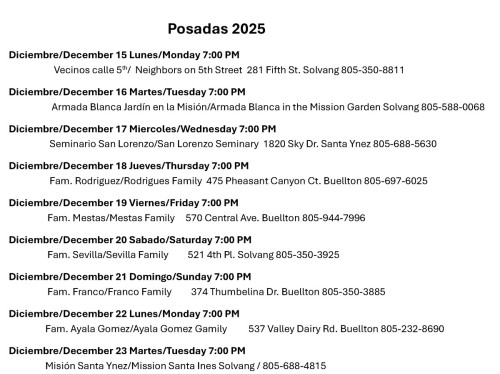

Las Posadas commemorate Mary and Joseph's difficult journey from Nazareth to Bethlehem and their search for a place to stay for the Christ Child to be born.
Las Posadas Song
Las Posadas December 15 - December 23 at these locations:

Please contact Hilda Navarro at 805 245-3233 or the parish office at 688-4815 for more information.
The Las Posadas event is organized by the Hispanic Comité Organizardor de Fiestas Ministry.
The Las Posadas tradition originated in Spain and was brought to Mexico from Spain in the 1500's by Catholic Missionaries. In Spanish, the word Posadas means dwelling or lodging. The Posadas begin on December 15th for nine evenings until December 23rd followed by December 24th's Midnight Mass.
Parishioners and anyone who wishes to join in meet at the locations and times listed above. The Posada begins with the recitation of the Holy Rosary, a very beautiful prayer to Mary, the Mother of Jesus. When a part of the Rosary is prayed by all those who have gathered for the
Posada, the group begins to proceed from the church to the local neighborhood.
The Posada can be led by a small group carrying a manger scene or the Posada can become quite elaborate with a live donkey and parishioners who are dressed like Mary and Joseph. Families in the parish are previously selected to participate in the Posada. Usually three locations are selected where the Posada does not take place. The participants stand before the door of each house and sing a song in Spanish asking to enter the house. A small group remains inside the house telling the outside group that it is impossible to enter.
Another family has been already selected to provide the Posada. The group proceeds along the street to the Posada house. Again, the Posada group sings from outside of the selected house and a small group sings the response from inside the house where the Posada will take place.
La Posada dinner, provided by the host family, may include such Hispanic dishes as tamales, menudo and posoli.
Each Posada ends with the traditional piñata that has seven corners. Each corner represents the Seven Deadly Sins. The beating of the piñata symbolizes the mortification that Christians exercise in overcoming personal sin. The candy within each piñata characterizes the sweetness of God's grace made available to us through the birth of Jesus.
